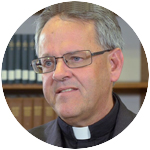
Father Thomas Dailey, O.S.F.S.
Among the countless articles and books I’ve read during my academic career, one title still stands out – “Life: A Story in Search of a Narrator.” In this philosophical work, Paul Ricoeur dismantles the commonsense belief that stories are told and not lived, while life is lived and not told.
To the contrary, he theorizes about how life is really told by living our own stories. We plot the significance of life when we configure the singular story of “me” from the multiple circumstances and events that make up the days of our lives.
We discover meaning in life when we forge a new perspective, when we learn to see a unifying whole amid so many disparate and seemingly unrelated occurrences (what Ricoeur calls “concord over discord”).
[hotblock]
This “narrative identity” means that life is neither absolute nor completely random. Who I am is not something stuck in the past (despite the desire of social media trolls). It is not constrained in the present by what happens to me or around me. It is not predetermined by the fates of the future.
No, I am who I become, in the continual process of narrating the story of a unique person who emerges from the past, dwells in the present, and lives toward the future.
Put more simply, my identity is not pre-determined. Rather, I shape (or narrate) the meaning of me by coming to understand all that happens within the framework of a larger story, a story not yet fully told. Every day, with knowledge gained from experience, I turn the page to read (and live out) the next chapter.
This narrative intelligence underscores both the “Word of God” Sunday proclaimed by Pope Francis and his papal message for this year’s World Communications Day.
In a message whose title (“Life Becomes History”) is reminiscent of Ricoeur’s philosophy, Pope Francis describes the powerful effect that stories have as they “influence our lives … leave their mark on us … shape our convictions and our behavior … (and) help us understand and communicate who we are.”
And who we are takes shape “by immersing ourselves in stories, (where) we can find reasons to heroically face the challenges of life.”
[tower]
In particular, the pope defines the biblical Word of God as “a Story of stories” that narrates “the great love story between God and humanity.” In the episodes of Sacred Scripture, we read histories and mysteries, romances and soap operas, along with a host of other tales that weave together the divine story of human salvation.
To paraphrase Ricoeur, the Bible gives a narrative intelligence to our lives. It enables us to see that “God has become personally woven into our humanity, and so has given us a new way of weaving our stories.”
In particular, the stories that Jesus tells – the parables – disclose to us the possibility of personal transformation. As Pope Francis puts it, through the parables “life becomes story and then, for the listener, story becomes life; the story becomes part of the life of those who listen to it, and it changes them.”
As a result, the inspired Word of God offers to us the overarching story of our lives and a key to our own narrative identity.
That divine story has already been told, when the God who “was so deeply concerned … for our flesh and our history … became man, flesh and history” to redeem us by his death and resurrection. Baptized into this very story, we can emerge from being entangled in the discord of our suffering and sin by letting the Good News of God’s mercy become the guiding narrative of our lives.
In that sense, the sacred story has yet to be told. We are called to become its narrators in and through the stories of our lives. Formed by the Word of God, ours is now the task of “remembering who and what we are in God’s eyes, bearing witness to what the Spirit writes in our hearts and revealing to everyone that his or her story contains marvelous things.”
Amid the many, often conflicting, stories that we hear via today’s media, it becomes all the more important for us to know, to remember, to recount, and to share with others this “Story of stories.”
When we engage in that kind of storytelling, and factor faith into our own narrative intelligence, then our lives will be reconfigured by the divine Word so that we may, indeed, live “happily ever after.”
* * *
Father Dailey is the John Cardinal Foley Chair of Homiletics and Social Communications at St. Charles Borromeo Seminary, Wynnewood, and a research fellow for the Catholic Leadership Institute in Wayne.
PREVIOUS: Limiting SNAP benefits also limits our love for one another
NEXT: Talking about God and grief with children



Share this story